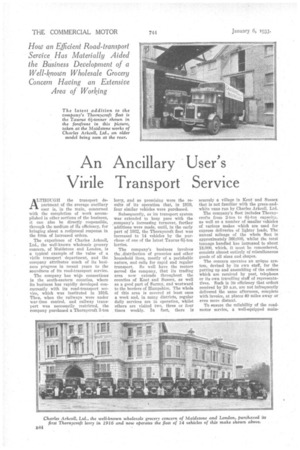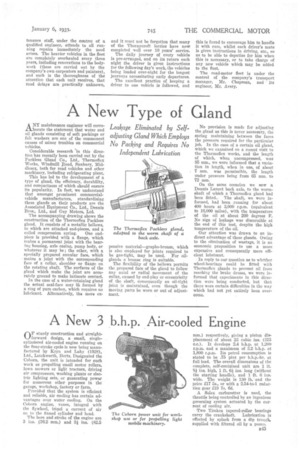An Ancillary User's Virile Transport Service
Page 58

Page 59

If you've noticed an error in this article please click here to report it so we can fix it.
ATHOTIGH the transport department of the average ancillary user is, in the main, concerned with the completion of work accomplished in other sections of the business, it can also be directly responsible, through the medium of is efficiency, for bringing about a reciprocal response in the form of increased orders.
The experience of Charles Arkcoll, Ltd., the well-known wholesale grocery concern, of Maidstone and London, is a typical example of the value of a virile transport department, and the company attributes much of its business progress in recent years to the soundness of its road-transport service.
The company has wide connections in the south-eastern counties, where its business has rapidly developed concurrently with its road-transport service, which was instituted in 1916. Then, when the railways were under war-time control, and railway transport was necessarily restricted, the company purchased a Thornycroft 3-ton lorry, and so promising were the results of its operation that, in 1919, four similar vehicles were purchased.
Subsequently, as its transport system was extended to keep pace with the company's increasing turnover, further 'additions were made, until, in the early part of 1932, the Thornycroft fleet was increased to 14 vehicles by the purchase of one of the latest Taurus 6i-ton lorries.
The company's business involves the ,distribution of groceries and other household lines, mostly of a perishable nature, and calls for rapid and regular transport. So well have the motors served the company, that its trading area now extends throughout the counties of Kent and Sussex, as well as a good part of Surrey, and westward to the borders of Hampshire. The whole of this area is covered at least once a week and, in many districts, regular daily services are in operation, whilst others are visited two, three or four times weekly. In fact, there is scarcely a village in Kent and Sussex that is not familiar with the green-andwhite vans run by Charles Arkcoll, Ltd.
The company's fleet includes Thorny' crafts from 2-ton to 6i-ton capacity, as well as a number of smaller vehicles of various makes which are used for express deliveries of lighter loads. The annual mileage of the whole fleet is approximately 360,000, whilst the total tonnage handled has increased to about 18,000, which, it must be remembered, consists almost entirely of miscellaneous goods of all sizes and shapes.
• The concern operates an unique system, devised by its own staff, for the putting up and assembling of the orders which are received by post, telephone or its own travelling staff of representatives. Such is its efficiency that orderg received by 10 a.m. are not infrequently delivered the same afternoon, complete with invoice, at places 40 miles away or even more distant.
To ensure the reliability of the roadmotor service, a well-equipped main tenance staff, under the control of a qualified engineer, attends to all running repairs immediately the need arises. The heavier vehicles in the fleet are completely overhauled every three years, including renovations to the bodywork (these are carried out by the company's own carpenters and painters), and such is the thoroughness of the attention that each unit receives, that road delays are practically unknown, and it must not be forgotten that many of the Thornycroft lorries have now completed well over 10 years' service.
The daily journey of every vehicle is pre-arranged, and on its return each night the driver is given instructions for the following day's work, the vehicles being loaded over-night for the longest journeys necessitating early departures.
The excellent practice of keeping a driver to one vehicle is followed, and this is found to encourage him to handle it with care, whilst each driver's mate is given instructions in driving, etc,, so as to be able to deputize for him when this is necessary, or to take charge of any new vehicle which may be added to the fleet.
The Toad-motor fleet is under the control of the company's transport manager, Mr. Chapman, and its engineer, Mr. Avery.




























































































